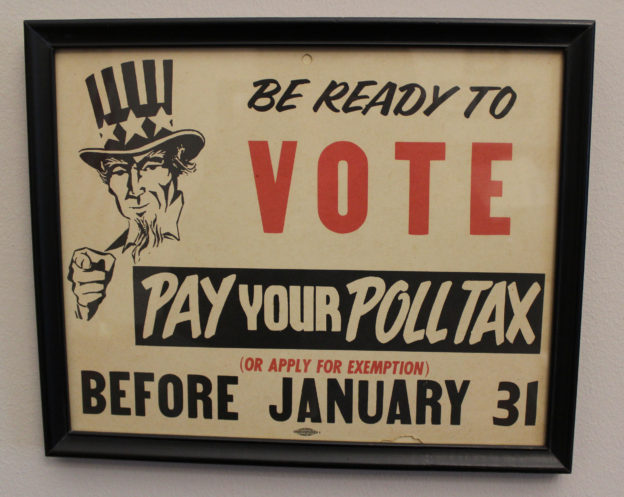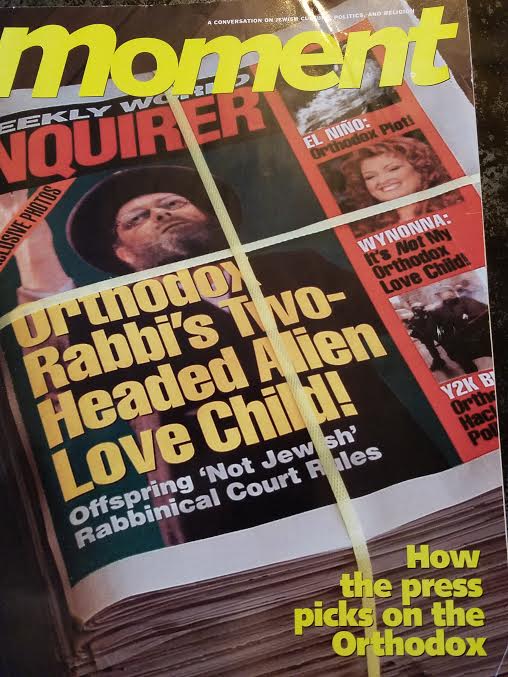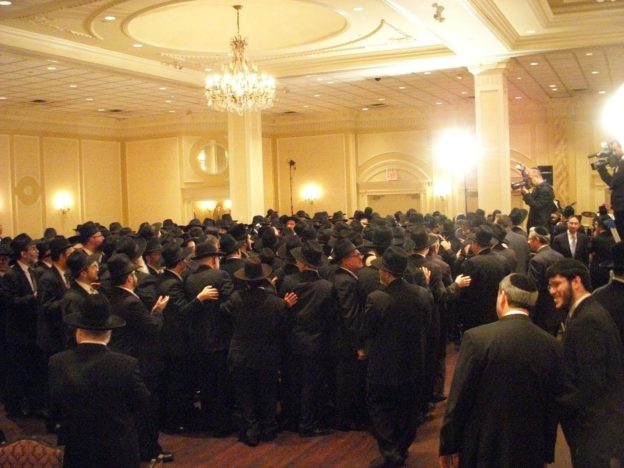“Past performance does not guarantee future results.”
I don’t own stocks, but am familiar with that disclaimer, required by the U.S. Securities and Exchange Commission for ads peddling investment opportunities.
It’s cited here because I’m about to share some choices, borne out as wise ones, that my wife and I made over the past decade and a half of involvement in the shidduchim of our children, as of recently, b”H, all married.
Of course, we know that the bottom line wasn’t our wisdom, hence the SEC-style disclaimer. That we so delight in our children-in-law, all of whom we see as our own children, if shared with our wonderful mechutanim, is, in the end, the result of siyatta diShmaya. And part of our brachah is who our children themselves are – which I attribute to the one of us who did most of the heavy lifting (literally and figuratively) in raising them. And both she and I have, as well, great zechus avos v’imahos.
So I can’t guarantee that doing what we did will yield the same results with which we’ve been blessed. I’m convinced, though, that those still “in the parashah” of shidduchim might find some of our choices to be worthy of consideration.
There are, of course, communities within Klal Yisrael that have formulated particular approaches to the various aspects of shidduchim. I don’t mean to speak to members of those communities, as they presumably follow the hadracha they have received. What follows here are simply the lessons gleaned by one pair of average parents, not authoritative pronouncements born of scientific analysis or nevuah.
We don’t run the show.
Although parents must make their proper hishtadlus in shidduchim, as in all things, we tried to avoid the trap of imagining that we can somehow know everything there is to know about a person or a family; or that we could, no matter the strength of our resolve and imagined wisdom, determine, or even imagine, the future. There are always myriad “unknown unknowns,” not only in the future but in the present. All one can, and must, do is try to do what is right. The ultimate success of any venture is always in Higher hands.
Corollary: Questions about any serious health issues are not improper. Questions about non-serious ones are. Ditto about the health histories of a prospective shidduch’s parents or grandparents.
Corollary: When it comes to researching a family’s reputation, dig, but don’t excavate. It’s a hishtadlus, not an FBI investigation.
Fretting is forbidden.
During “dry spells,” we didn’t engage in, or allow, handwringing. It serves no constructive purpose, and is in fact destructive in many ways. “Bishaah tovah” isn’t just a throwaway phrase, or even simply a brachah. It is a truth. There are auspicious times for things to happen, and we aren’t privy to knowing those times. And, as the chassidishe vort has it, all yiush (despair) is shelo midaas (without thought).
Look for the best match.
That is to say, not necessarily the most meyuchas young man or woman, the most high-community-status family, the wealthiest, or the one who is most like oneself… What is being sought is the best match for the person being matched. It’s a life-partner being looked for, after all, not a badge of honor, stock portfolio or carbon copy. When my wife and I had the luxury of choosing among several proposed possible shidduchim for one of our children, we always kept paramount in our minds that we were seeking the best complement for the particular son or daughter.
And never, after the fact of a successful shidduch, did we ever allow ourselves to think that “We could have done better.” There is no “better”; there is only what is right. And what’s right is better than better; it’s best.
Corollary: While a young person is wise to confide concerns to his or her parents, and the parents are wise to offer their feelings, the final judgment about continuing, discontinuing or becoming engaged must be the young person’s. And no pressure to make a particular decision should ever be brought to bear on him or her.
Corollary: Making a particular educational background or yeshiva gedolah (or type of one) a requirement for a young man is unwise. As is making cooking skills, appearance, or a particular vocation or income-potential a requirement for a young woman. Adjustments to “dream futures” can be – and usually are – made by married couples. All that really matter are the shared goals and the suitability of the individuals to each other.
Hint: Shidduchim suggested by siblings or friends of the single are particularly worth pursuing.
…And for the biggest mentch.
There are many maalos that may inhere in a young man or young woman being proposed as a shidduch. For men, it might be excellence in Torah-study or accomplishments in other realms; for women, it might be scholastic achievement or exemplary homemaker skills. The most important qualifying credential, in our experience, is mentchlichkeit. The personal character of a person, we believed and believe, stands well above and beyond all others on the roster of maalos. When “doing research” on a prospect, while we were certainly interested in accomplishments, reputations and skills, what really mattered to us were accounts of how the prospect interacted with others, and accounts of their personal good will and consideration of others. That might seem obvious, but it can’t be sufficiently stressed.
Parents of a young person seeking a spouse, and the young person, are not yeshivah administrators seeking a Rosh Yeshivah or a hotelier looking to hire a caterer. We’re talking marriage here – building a happy home and raising a Torah-centered family. Eyes must always be kept on the prize, and it’s not a sefer or a cooking award.
Hint: Ask someone who would know about how the prospective shidduch davens.
Corollary: Baalei teshuvah should be given the same consideration as anyone, if not greater.
Corollary: If asked for a photo, the ideal answer is a simple “no.”
Don’t promise what can’t be delivered.
While there are stories of parents who pledged financial assistance they simply didn’t have and who miraculously became beneficiaries of unforeseen windfalls, “ein somchin al hanes” is the operative principle in life. We considered it wrong to pretend or imply in any way that we had resources we did not. In fact, throughout our shidduch-making years, we were never in a position to pledge support – any support – to a potential marriage partner for our daughters (nor did we ever request support for our sons). Did that shrink the pool of prospects? Surely it did (at least in the case of daughters), but that wasn’t a bad thing. It narrowed down the “contenders,” making decisions less fraught.
As a result, our daughters married young men who either did not, to their credit, expect support, or who didn’t need it. Some of those chassanim, now all wonderful fathers, intended to learn for years, and did so. They and their wives were willing to live simply – in some cases very simply. Others pursued parnassah, either part-time or full-time. All, though, are bnei Torah who are koveia itim laTorah and dedicated to raising their own children to cherish Torah and Yiddishkeit. Does anything else really matter?
No “no”s after one meeting.
Unless a prospective partner is judged to be utterly, outlandishly, painfully “wrong” after a first meeting, a second one is always proper. Few people are zocheh to be able to perceive all that needs perceiving – or to project all that needs projecting – when meeting a stranger for the first time.
Chasunos are not marriages.
Chasunos last a few hours. Marriages, with determination and siyata diShmaya, last lifetimes. And there is zero correlation between, on the one hand, the number of hot dishes (or lack of them) at a reception, the number of courses at a seudah, the reputation of the photographer or the lavishness of a wedding hall and, on the other, the success of a marriage or the happiness of the couple. Even at the chasunah itself, the joy of the friends of the chassan and kallah and the others present, and the joining of two sets of parents in a shidduch are what beget the true simchah of the event. Nothing else makes any difference
The rule should be that when there is a choice, be it ring, gifts, hall, caterer, band, photographer, or any other element of an engagement and chasunah, the less expensive, more simple option should win out. It can’t be sufficiently stressed that Thoreau’s advice “simplify, simplify” could not be better placed than in the context of a chasunah.
I realize that bands, photographers and “high end” establishments all need to make their parnassos. But they’re not endangered; there will always be people who will dismiss the advice my wife and I offer here. If you’re smart, though, you won’t.
And may you have hatzlacha in all.
© 2017 Binah Magazine








